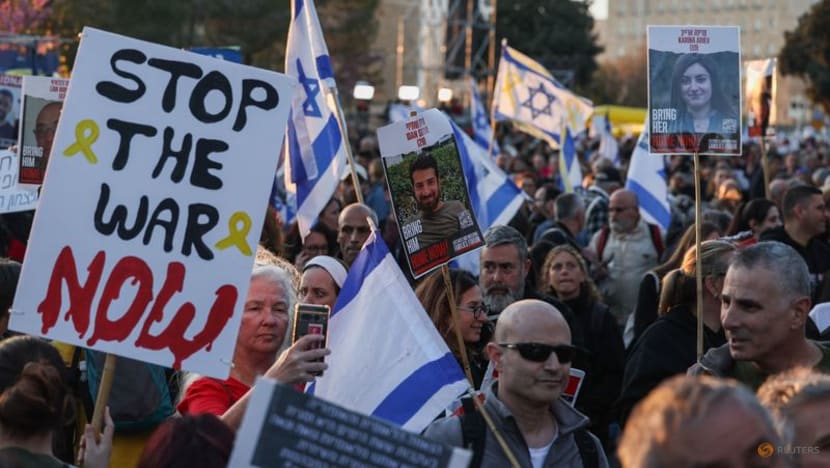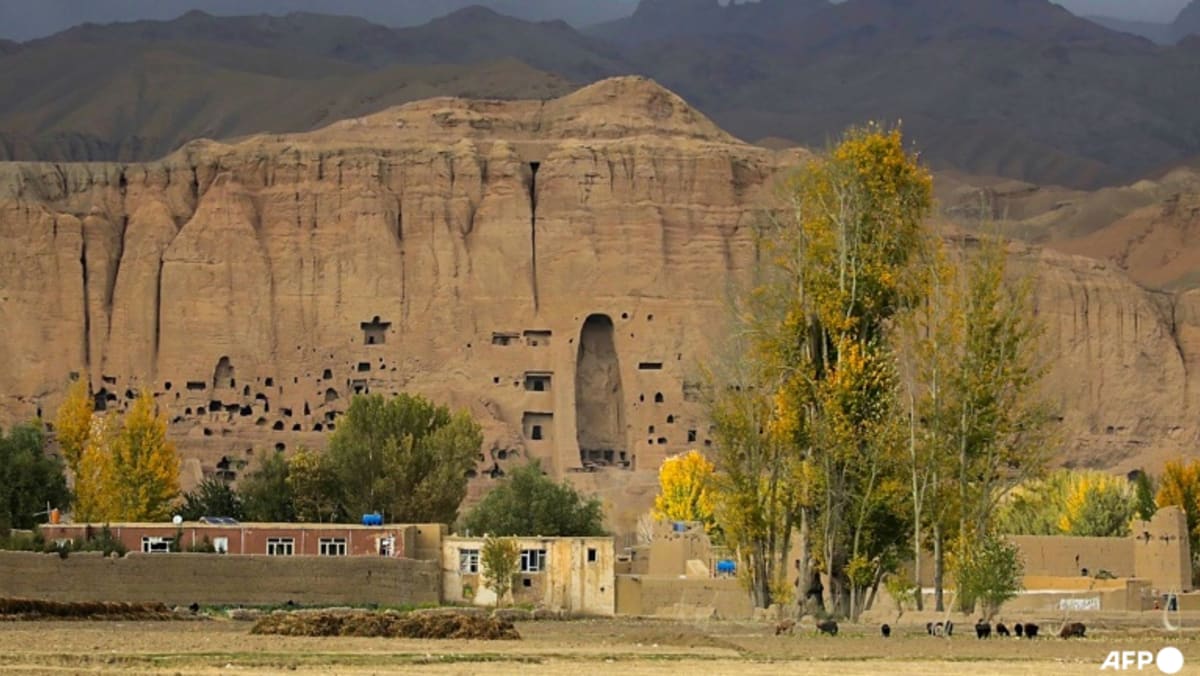The conflict has sparked a humanitarian crisis leaving scores of Gazans without food, water and electricity.

Israelis rally for the immediate release of the hostages, six months after they were kidnapped during the deadly October 7 attack on Israel by Palestinian Islamist group Hamas from Gaza, near the Knesset, Israel's parliament in Jerusalem, April 7, 2024. REUTERS/Ronen Zvulun
New: You can now listen to articles.

Sorry, the audio is unavailable right now. Please try again later.
This audio is AI-generated.
Six months have passed since a surprise attack by Palestinian militant group Hamas on Israel triggered a war in the Gaza Strip, and set off a humanitarian crisis that has left scores of residents without food, water and electricity.
Fresh talks in Cairo aimed at reaching a truce have made “significant progress”, and more negotiations are expected in the next few days, according to some reports.
When did the war begin, and what has happened since?
On Oct 7, Hamas gunmen stormed into southern Israel and went on a killing spree.
About 1,200 people - most of them civilians - were killed in the unprecedented attack. The militants also seized around 250 Israeli and foreign hostages, about 130 of whom are still believed to be held in Gaza.
Israeli Prime Minister Benjamin Netanyahu then vowed “mighty vengeance” against Hamas.
Israel's retaliatory campaign to annihilate the movement has since killed more than 33,000 people - mostly civilians - in Gaza, according to the enclave’s health ministry, and left entire neighbourhoods in shambles.
On whether Israel is anywhere close to reaching its aim of fully eliminating Hamas, Middle East analyst Laura Blumenfeld, a senior fellow at the The Philip Merrill Center for Strategic Studies at Johns Hopkins School for Advanced International Studies, said: “I would say that they've degraded Hamas. Have they destroyed Hamas? Clearly, no. Some would call it a stalemate.”
 Israeli soldiers take position as they enter the UNRWA headquarters, where the military discovered tunnels underneath of the U.N. agency that the military says Hamas militants used to attack its forces during a ground operation in Gaza, Thursday, Feb. 8, 2024. The Israeli military says it has discovered tunnels underneath the main headquarters of the U.N. agency for Palestinian refugees in Gaza City, alleging that Hamas militants used the space as an electrical supply room. The unveiling of the tunnels marked the latest chapter in Israel's campaign against the embattled agency, which it accuses of collaborating with Hamas. (AP Photo/Ariel Schalit)
Israeli soldiers take position as they enter the UNRWA headquarters, where the military discovered tunnels underneath of the U.N. agency that the military says Hamas militants used to attack its forces during a ground operation in Gaza, Thursday, Feb. 8, 2024. The Israeli military says it has discovered tunnels underneath the main headquarters of the U.N. agency for Palestinian refugees in Gaza City, alleging that Hamas militants used the space as an electrical supply room. The unveiling of the tunnels marked the latest chapter in Israel's campaign against the embattled agency, which it accuses of collaborating with Hamas. (AP Photo/Ariel Schalit)
Israel said last month that it has killed more than 13,000 militants since the start of the war.
However, the Israeli offensive has displaced most of the territory’s 2.3 million people, with residents saying they have no safe place to flee to.
A week-long ceasefire at the end of November saw a total of 105 hostages - 80 of them Israelis - released by Hamas in return for 240 Palestinians. It also allowed aid agencies to increase their deliveries of essential supplies into Gaza.
Since then, little progress has been made.
Many residents are facing unsanitary conditions and food shortage, as the delivery of aid is slowed by the cumbersome process of inspections of trucks into the enclave.
The United Nations has warned of imminent famine. Aid agencies have labelled the situation as a catastrophe, saying the conflict has brought about the collapse of the humanitarian system in Gaza.
How has international opinion shifted?
Since the Oct 7 attack, there has been a dramatic shift in opinions globally.
Initially, there was “solidarity and support for the state of Israel, the Israeli flag projected onto buildings around the world, strong condemnation including from Arab states against Hamas' actions”, said Mr John Lyndon, executive director at the Alliance for Middle East Peace, an organisation of peace groups.
“Over the last six months, the picture has transformed. Part of this is due to, I think, the unprecedented level of destruction, particularly in the early phase of the war.”
There has been widespread condemnation and criticism of Israel’s actions, and people from several countries have taken to the streets in protest.
“I think what we've seen is the culmination and the failure of a strategy that had been in place for a very long time around the idea that this conflict could be managed,” said Mr Lyndon on Israel's growing isolation.
Last month, the International Court of Justice, the world's top court, ordered Israel to "ensure urgent humanitarian assistance" in Gaza without delay. However, Israel did not abide by the ruling.
 Israel Prime Minister Benjamin Netanyahu (Left) greets US President Joe Biden upon his arrival at Tel Aviv's Ben Gurion airport on October 18, 2023, amid the ongoing battles between Israel and the Palestinian group Hamas. Biden spoke by phone with Netanyahu April 4, 2024, the White House said, amid growing outrage over an Israeli strike that killed seven aid workers in Gaza. (File photo: AFP/File/Brendan SMIALOWSKI)
Israel Prime Minister Benjamin Netanyahu (Left) greets US President Joe Biden upon his arrival at Tel Aviv's Ben Gurion airport on October 18, 2023, amid the ongoing battles between Israel and the Palestinian group Hamas. Biden spoke by phone with Netanyahu April 4, 2024, the White House said, amid growing outrage over an Israeli strike that killed seven aid workers in Gaza. (File photo: AFP/File/Brendan SMIALOWSKI)
Countries are now mounting pressure on both sides to end the war.
Israel's staunchest allies, including the United States, are now using their toughest language to call for an immediate ceasefire.
There is “increasing frustration on the part of the United States”, particularly on how Israel is conducting this war, said Dr James Dorsey, adjunct senior fellow at the S Rajaratnam School of International Studies.
“The US president was very firm about what he wanted. That included the ceasefire, that included significantly scaled-up flow of aid into Gaza and protection of civilians.”
US President Joe Biden, in a phone call with Mr Netanyahu last Thursday following a deadly Israeli strike that killed seven humanitarian workers in Gaza, "made clear that US policy with respect to Gaza will be determined by our assessment of Israel's immediate action" to curtail the killing of civilians and aid workers and improve the dire humanitarian situation.
“International opinion is not something Israel pays attention to,” Dr Dorsey told CNA’s Asia Now on Sunday.
“(But) it pays attention to the US' opinion, and it pays attention to the stance that the Biden administration is taking.”
Within hours of the 30-minute phone call between the two leaders, Mr Netanyahu's office said it would temporarily allow more aid to flow into Gaza.
“He took some measures to try and answer at least some of Biden's demands,” said Dr Dorsey.
“Fact of the matter is, however, that Israel's international standing has been devastatingly tarnished, and it's going to take quite an effort to repair that damage.”
Why is Netanyahu facing domestic pressure?
On the home front, Israel is deeply divided as the war drags on.
Mr Netanyahu is facing growing pressure, as Israelis are increasingly dissatisfied with his management of the ongoing conflict.
“Netanyahu's space for manoeuvring is getting narrower and narrower,” said Dr Dorsey.
On Saturday, there were large demonstrations nationwide, with thousands of Israelis taking to the streets calling for Mr Netanyahu to resign as the war in Gaza reached its half-year mark. Protesters have stepped up their demands for the government to secure the release of hostages still held by Hamas.
Even amid calls for him to step down, the country’s longest-serving prime minister is a “very skilled political operator” and will likely “hang on as long as he can”, Mr Lyndon told CNA’s Asia Tonight on Sunday.
Where is the conflict heading?
Israel and Hamas have sent teams to Cairo for talks on a potential ceasefire deal.
Dr Dorsey believes the positions taken by both sides are far apart, adding: “I think it's complex. If you look at these negotiations over the last few months, they're going round in circles.”
However, some observers believe there is a lot of momentum to wrap up this war.
Mr Lyndon said: “What I hope, and I'm increasingly cautiously optimistic about, is that we're moving to the final phase and the end of this war.
“I think everybody's thoughts need to be with the negotiations taking place in Cairo for a ceasefire and hostage release deal that can really catalyse that next phase, where we stop focusing on the day-to-day and the horrific events, and instead look in that longer term of what we're trying to achieve diplomatically.”
He called for a multilateral approach to resolving the conflict, adding that the world has to treat it as a “big geopolitical issue” that needs to be solved.
Mr Lyndon noted that change needs to not just be elite-driven and can also come from the bottom up, adding that civil society can push politicians to move towards peace.
“It's the only way to stop the recurrence of events like we've seen over the last six months,” he added.
Ms Blumenfeld told CNA’s Asia First on Monday that Israel’s domestic politics will likely impact the outcome of the truce talks.
“You're seeing larger and more vocal demonstrations in the streets,” she added.
“Diplomatically, the Palestinian issue is in front of the world now, and perhaps we have an opportunity to resolve it once and for all.”
Want an issue or topic explained? Email us at digitalnews [at] mediacorp.com.sg. Your question might become a story on our site.













 English (US) ·
English (US) ·  Turkish (TR) ·
Turkish (TR) ·